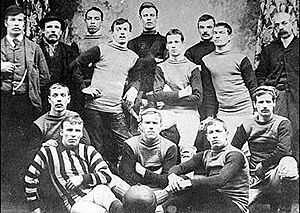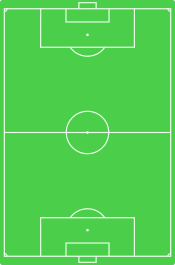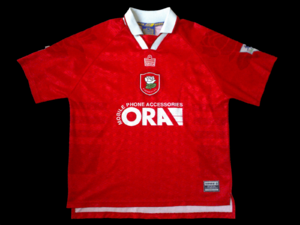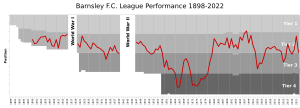History of Barnsley F.C. facts for kids
Barnsley Football Club is a professional football team from Barnsley, South Yorkshire, England. They are known for their long history and their exciting journey through different football leagues.
Contents
- The Early Years and FA Cup Glory (1887–1912)
- Wartime and Post-War Barnsley (1913–1959)
- The Long Road to the Top (1960–1995)
- Promotion to the Premier League (1996–97)
- The Premier League Season (1997–98)
- Pushing for a Return to the Premier League (1998–2001)
- Relegation to the Third Tier (2001–02)
- Financial Troubles and New Owners
- Stuck in the Third Tier (2002–2005)
- Promotion to the Championship (2005–06)
- Championship Years and FA Cup Success (2006–2014)
- Promotion to the Championship and FL Trophy Winners (2014–2016)
- Back in the Championship, New Shareholders and Ownership (2016–Present)
The Early Years and FA Cup Glory (1887–1912)
The club started in 1887 as Barnsley St. Peter's. It was founded by Reverend Tiverton Preedy in an area that mostly played rugby. Within a year, they began playing at their home ground, Oakwell. They joined the Sheffield and District League in 1890, then the Midland League in 1895.
In 1897, the club changed its name to Barnsley Football Club. This happened after Reverend Preedy left, and the team's fans grew beyond the local church area. They did well in the Midland League and also played in the Yorkshire League. Because of their success, they joined the Football League in 1898.
|
1912 FA Cup winning squad |
Their first game in the Football League was a 1–0 loss to Lincoln City in September 1898. Their first league win was 2–0 at home against Luton Town. John McArtney scored Barnsley's first league goal from a penalty.
The team struggled in Division Two for about ten years. This was partly because they had money problems. But in the 1909–10 season, they played much better. They had an amazing run in the FA Cup, beating strong teams like Blackpool and Everton to reach the final. They played Newcastle United and were winning 1–0 until Newcastle scored a goal in the last minute. The replay match ended with Barnsley losing 2–0.
The next season, they finished low in the league and had to ask to stay in the Football League, which they were allowed to do.
FA Cup Victory in 1912
The 1911–12 season was much better. The team was strong again and did very well in the FA Cup. They also played well in the league, though they didn't get promoted to the top division.
In the FA Cup, they beat teams like Birmingham City and Bolton Wanderers. They had a tough semi-final against Swindon Town. In the final, they played West Bromwich Albion. The first match was a 0–0 draw. The replay game was at Bramall Lane. Neither team scored until the last two minutes, when Harry Tufnell scored a goal. This goal won the FA Cup for Barnsley! It was the only time in their history they have won this famous trophy. They also finished sixth in the league, their best position yet.
Wartime and Post-War Barnsley (1913–1959)
In the next two seasons, Barnsley finished fourth and fifth in the league. They were close to reaching the top division but didn't quite make it. Football was then stopped because of the First World War. When the league started again in 1919, Barnsley hoped to be promoted. However, Arsenal went up instead after a controversial decision.
In 1921–22, Barnsley missed promotion by just one goal difference. Stoke City needed to win their final game by 3–0 to go above Barnsley, and they did exactly that. It was the closest Barnsley ever came to promotion without achieving it.
After this, Barnsley stayed in the Second Division during the 1920s. They scored many goals but also let in many. In the 1930s, they moved between the Second and Third Division. Football stopped again because of the Second World War.
After the war, Barnsley's performance was similar. Famous players from this time included George Robledo and Tommy Taylor. By 1953, Barnsley was relegated to Division Three. They were promoted two years later but went back down in 1959.
The Long Road to the Top (1960–1995)
The 1960s and 1970s were tough years for Barnsley. They were not as good as they used to be, often playing in the Third and Fourth Division. This is remembered as a very disappointing time for the club.
However, the club started to get better in the late 1970s. They moved from Division Four up to Division Two in just two years. Key players in this success included Neil Warnock and Mick McCarthy. The arrival of player–manager Allan Clarke from Leeds United was very important. He helped rebuild the team. His Leeds teammate Norman Hunter also joined the club and later managed it.
In the 1980s and early 1990s, Barnsley became a strong team in Division Two. They started to challenge for a place in the top division again for the first time in many years.
Promotion to the Premier League (1996–97)
After the 1995–96 season, some important players left Barnsley. Manager Danny Wilson brought in new players who would play big roles. These included experienced players Neil Thompson and Paul Wilkinson, and young player Matty Appleby.
Oakwell also welcomed international players like Jovo Bosancic and Trinidad and Tobago international Clint Marcelle. Marcelle's work permit was approved just before the first game of the season. He scored the first goal in a 2–1 win against West Bromwich Albion. Barnsley then won their next four games, matching their best start to a season. Wilson also signed Scottish forward John Hendrie.
As the season went on, Bolton Wanderers looked set to win the league. Barnsley drew both their games against Bolton 2–2. Towards the end of the season, it looked like Barnsley or Wolverhampton Wanderers would join Bolton in promotion.
In Barnsley's last home game, a Yorkshire derby against Bradford City, a win would secure promotion to the top division for the first time ever. Barnsley played very well and led 1–0 at half-time from a Paul Wilkinson goal. With only a few minutes left, Clint Marcelle scored the final home goal. When the whistle blew, fans rushed onto the pitch to celebrate.
The team lost their final game 5–1 away at Oxford United. But the joy of promotion lasted all summer. The team had a big open-top bus celebration around the town, ending at the town hall.
The Premier League Season (1997–98)
Being promoted was exciting, but the team knew they had to work hard to stay in the top league. Neil Thompson and Paul Wilkinson left. Manager Wilson brought in several international players. These included Slovenia captain Aleš Križan, South African Eric Tinkler, and Welshman Darren Barnard. They also signed Macedonian striker Georgi Hristov for a club record fee of £1,500,000. German reserve goalkeeper Lars Leese also joined.
The team started well. Neil Redfearn scored an early goal in their first game against West Ham United. However, West Ham scored two goals in the second half, and Barnsley lost. Their first win came away at Selhurst Park, where Neil Redfearn scored again for a 1–0 victory over Crystal Palace.
After this, they had a bad run of results. This included big home losses like 6–0 to Chelsea and 5–0 to Arsenal. They also lost 7–0 to Manchester United at Old Trafford. Despite these losses, fans still enjoyed the experience. After being 6–0 down against Chelsea, Barnsley supporters sang, "We're going to win 7–6".
Wilson strengthened the team by signing strikers Ashley Ward and Jan Åge Fjørtoft, and defender Peter Markstedt. One of the season's highlights was getting revenge on Manchester United. They drew 1–1 in the FA Cup at Old Trafford. In the replay at Oakwell, two goals from Barnsley youth player Scott Jones and one from John Hendrie helped Barnsley beat Manchester United 3–2. Barnsley then lost 3–1 away to Newcastle United in the next round.
Another great moment was a 1–0 win at Anfield against Liverpool, with Ashley Ward scoring the goal. The return game at Oakwell was very memorable. Barnsley had been playing well, and fans hoped they could avoid relegation. The score was 1–1 when the referee sent off Barnsley players Darren Barnard and Chris Morgan. Liverpool then scored to make it 2–1. The referee left the pitch for a short time without telling anyone why. When he returned, Barnsley scored an equalizer. In the last seconds, the referee sent off another Barnsley player, Darren Sheridan, and Liverpool scored the winning goal from the free kick.
Results then got worse, and Barnsley won only one of their last nine games. This was a 2–1 victory over local rivals Sheffield Wednesday. Barnsley was relegated after a 1–0 loss at Leicester City. They played their final game at home against Manchester United, losing 2–0. That summer, manager Danny Wilson left Barnsley to join Sheffield Wednesday.
Pushing for a Return to the Premier League (1998–2001)
|
Squad on 27 November 1998 vs Huddersfield Town (7–1 victory) |
John Hendrie became the new manager, hoping to get Barnsley back to the Premier League. However, their chances were hurt when captain Neil Redfearn was sold. Barnsley finished 13th that season. A highlight was a big 7–1 home win against local rivals Huddersfield Town. After this season, more players from the promotion team left, including Arjan de Zeeuw and Clint Marcelle.
Before the 1999–2000 season, John Hendrie was replaced by Dave Bassett. Bassett had been successful with other clubs. He brought in new players like Neil Shipperley and former England international Geoff Thomas.
Barnsley finished fourth in the league, which meant they would play in the promotion play-offs. They faced Birmingham City. In the first game at St. Andrew's, Barnsley won an amazing 4–0 away from home.
The return game at Oakwell seemed easy, but Barnsley lost 2–1. Play-off excitement took over the town, as Barnsley had never played at Wembley before. About 35,000 fans traveled to see them play Ipswich Town. Barnsley took the lead through attacking midfielder Craig Hignett. Ipswich equalized. Just before half-time, Barnsley got a penalty, but Darren Barnard's shot was saved by future England goalkeeper Richard Wright.
After half-time, Ipswich scored two goals. Barnsley got another penalty, which Craig Hignett scored. With time running out, Georgi Hristov came on as a substitute, and his header was brilliantly saved by Wright. As the game ended, Barnsley conceded a fourth goal, meaning they would stay in Division One. Many important players left that summer, and the next season saw them finish in the middle of the table.
Relegation to the Third Tier (2001–02)
The 2001–02 season was interesting because it included three other teams from South Yorkshire. This meant derby games against Sheffield United, Sheffield Wednesday, and Rotherham United would be important.
Barnsley started the season with a tough 4–0 loss away to Bradford City. This set the tone for a difficult season. They didn't win an away game until late December against Stockport County. After a decent start, results got worse, and the team found themselves near the relegation zone.
Barnsley's away form was very bad, so they relied on winning home games for points. Despite their efforts, it came down to the final home game against Norwich City. Barnsley needed a win to avoid relegation. On April 13, Barnsley lost 2–0 and were relegated out of the top two divisions for the first time in over twenty years. They finished the season with only their second away win, against Wimbledon.
Financial Troubles and New Owners
After being relegated, the club faced serious financial problems. In October 2002, the club went into a special financial process called "administration". This meant they had to find a new owner quickly or the club would close.
Just ten days before the deadline, it was announced that Peter Doyle, the Mayor of Barnsley, would take over the club. This was confirmed in December, but it took months for the league to approve it. Many fans were not happy with this new ownership.
In the summer of 2003, there were more attempts to sell the club. A deal was almost made with a businessman from California, which led to manager Glyn Hodges leaving. But the Football League rejected this deal because it wouldn't clear the club's debts.
In September 2003, former Leeds United chairman Peter Ridsdale and local businessman Patrick Cryne bought the club. Ridsdale later stepped down, and ownership was transferred to Gordon Shepherd, with Cryne remaining a key figure.
Stuck in the Third Tier (2002–2005)
Barnsley's struggles off the field were matched by their mixed results on the pitch. However, they managed to avoid a second relegation in a row in their final home game of the season against Brentford. Isaiah Rankin scored a dramatic goal in injury time, securing their safety.
The next summer was confusing, but Icelandic manager Gudjon Thordarson was appointed. Barnsley was only allowed to play in the league 24 hours before their first game. They started well, even reaching the top spot sometimes. Hopes for promotion were high. But after only one win in January and February, Thordarson was sacked after a big 6–1 loss to Grimsby Town. Paul Hart took over, but Barnsley finished twelfth, with only four wins since December.
A poor start to the next season saw Barnsley drop to 20th place. They stayed near the relegation spots until December. After another bad spell in February, Hart was sacked, even though his last game was a 4–1 win. Academy coach Andy Ritchie became temporary manager. He started well, winning the Manager of the Month award for March. Barnsley finished strongly, ending in 13th place.
Promotion to the Championship (2005–06)
Barnsley continued their good form in the new season. They finished fifth in the league, which meant they would play in the play-offs against local rivals Huddersfield Town.
Barnsley lost the first game at home 1–0, making it seem like they would stay in League One. But 4,000 Barnsley fans traveled to the away game at the Galpharm Stadium. Paul Hayes scored a penalty, making the crowd erupt. Huddersfield equalized, but goals from captain Paul Reid and a late winner from Daniel Nardiello put Barnsley into the play-off final. This was the first time in play-off history that a team had come back to win after losing the first home game.
The final was played at the Millennium Stadium, Cardiff, in front of 55,419 fans. Barnsley took the lead with a goal from Paul Hayes. Swansea replied with two goals. But Barnsley fought back. A free kick from Daniel Nardiello brought Barnsley level. The game went into extra time, with both teams having chances.
The match was decided by penalties. Goalkeeper Nick Colgan became a hero, saving the winning penalty from Alan Tate. This gave Barnsley a 4–3 win in the shootout and a place in the Championship!
Championship Years and FA Cup Success (2006–2014)
Barnsley managed to stay in the Championship in their first season back, finishing 20th.
|
Barnsley line up against Chelsea on 8 March 2008 |
After six players left, manager Simon Davey brought in fourteen new players, mostly from other countries. Barnsley started the season very well, doing better than expected and reaching the top six of the Football League Championship. Their form dropped in December and January, as they went eight league games without a win. However, they beat Blackpool and Southend United in the FA Cup.
Barnsley stayed in the lower middle of the Championship table. On February 16, they traveled to Anfield to play Liverpool in the 5th round of the FA Cup. They pulled off a surprising 2–1 victory. Goalkeeper Luke Steele, who was on loan, played brilliantly. Stephen Foster equalized in the second half, and captain Brian Howard scored the winning goal in the last moments. This sent them to the quarter-finals for the first time since 1999.
In the quarter-finals, they faced Chelsea at Oakwell. Barnsley played amazingly against the FA Cup holders. Kayode Odejayi's header in the second half was enough to put Barnsley into the semi-final for the first time since they won the Cup in 1912. With only Portsmouth left from the Premier League, Barnsley had a real chance to win the FA Cup again. They were drawn against Cardiff City in the semi-finals at Wembley. However, Cardiff beat Barnsley 1–0, ending their FA Cup dream.
Barnsley did secure their place in the Championship for the next season, finishing 18th.
In 2008–09, manager Simon Davey made history by playing the youngest ever player in Football League history. Reuben Noble-Lazarus was only 15 years and 45 days old when he came on as a substitute.
Barnsley stayed in the second division for six more seasons. They didn't finish higher than 17th (2010–11). In 2013–14, they were relegated back to the third division, finishing 23rd.
Promotion to the Championship and FL Trophy Winners (2014–2016)
Barnsley was promoted back to the Football League Championship in their second season in the third division. They beat Millwall 3–1 in the League One play-off final at Wembley Stadium. Barnsley also won the Football League Trophy that season, beating Oxford United 3–2 in the final.
In December 2017, it was announced that Patrick Cryne and his family had agreed to new shareholders and co-owners for Barnsley Football Club. A group led by Chien Lee of NewCity Capital and Pacific Media Group (Paul Conway and Grace Hung) joined. Billy Beane and Neerav Parekh also invested. Chien Lee held 80% of the shares, and the Cryne family held 20%.
Despite the new owners, Barnsley was relegated to League One again in 2017–18. However, they were promoted back to the Championship the following season. They managed to avoid relegation from the Championship in 2019–20. In 2020–21, under manager Valérien Ismaël, Barnsley finished fifth. They reached the EFL Championship Play-offs for the first time in 24 years. They did this with one of the youngest teams and smallest budgets in the league. The Wall Street Journal even called Barnsley a "Moneyball experiment".
Before the 2021–22 season, Markus Schopp became the new head coach. In November 2021, Schopp was sacked after seven straight defeats. Three weeks later, Poya Asbaghi was appointed. However, Barnsley was relegated from the 2021–22 EFL Championship after a 2–1 loss to Huddersfield Town. Asbaghi left the club soon after. On June 15, 2022, Michael Duff was appointed head coach.
In May 2022, the ownership structure of the club changed again. Neerav Parekh bought more shares, and Matt Edmonds also bought shares. The new ownership is now split between Neerav Parekh (55.59%), the Cryne family (21.30%), Julie Anne Quay and Matt Edmonds (10%), Chien Lee (9.20%), and Conway’s company Pacific Media Group (3.91%). With these changes, Paul Conway, Chien Lee, Grace Hung, and Dickson Lee were removed from the board. Jean Cryne and Julie Anne Quay joined the board instead.
 | William L. Dawson |
 | W. E. B. Du Bois |
 | Harry Belafonte |





